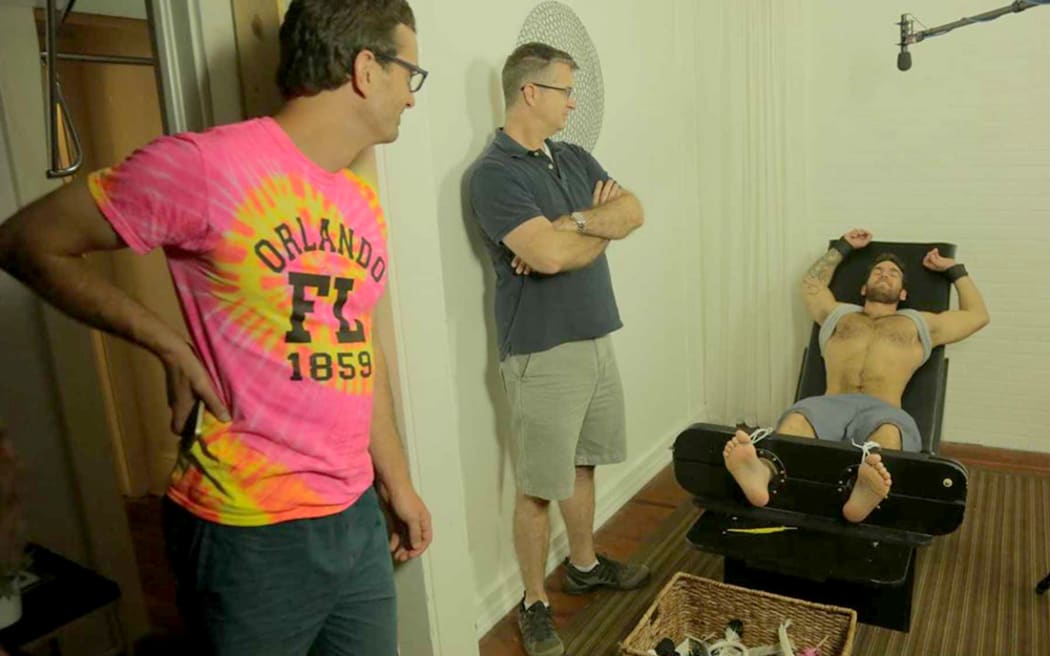Tickled finds humour in the absurd, but its subjects truly shine once David Farrier steps aside.

Photo: NZIFF
Tickled opens with Hilary Barry’s disembodied voice declaring David Farrier “everyone’s favourite pop culture journalist”, a clip no doubt extracted from his days at TV3.
Whether this is true for “everyone” is possibly debatable, but the introduction clearly and deliberately foregrounds Farrier as the star of the show. For international audiences the introduction is perhaps necessary: Farrier - he of the two minute zany infotainment segments, the Colin Craig sauna debacle, the pet parrot - is so well known, so contextualised here in his home country, that maybe it is hard to imagine the documentary starting any other way.
So much so that it is almost surprising that the film spends as much time in the company of fellow documentarian and co-star of sorts, Dylan Reeve, with whom Farrier embarks on his odyssey.
And odd it is. Tickled follows Farrier and Reeve as they investigate the mysterious sport of competitive endurance tickling, for which young men around the world are being recruited. Documented in some bizarre YouTube videos, it's quickly apparent that not all is as it seems, and when the filmmakers receive personal abuse and legal threats from the organisers, they decide to dig deeper.
The film spans Farrier’s discovery, confusion and subsequent investigation of these shady tickling competitions with uncluttered linearity. This is by no means a bad thing, but it does lead to some fairly disingenuous footage of Farrier and Reeve pretending to take the first steps in beginning the investigation. These are so clearly after the fact that their feigned surprise comes across as slightly camp.
But maybe it’s meant to be? At the Auckland premiere in at The Civic Theatre last night, the audience were frequently vocal in their amusement to an extent not often observed at documentaries.
In fact, the levels of revelry were almost conspicuous given that Tickled is often an uncomfortable, if not disturbing, watch. As it becomes apparent that all is not what it seems within the tickling ring that Farrier and Reeve uncover, issues of manipulation, exploitation, blackmail and abuse surface.
In a way, it's this discomfort that makes the film: Farrier and Reeve make contact with the producer of a more transparent tickling video business, who allows them to film him in the act of tickling an entirely reasonable and willing participant.
Tickling, when you really think about it, is completely bizarre and to watch it is somehow nearly as excruciating. There is a strange sort of physical empathy - sympathy tickles, perhaps - and worse than that is a kind of weird cognitive dissonance between the laughter and smiling, and the clear pain and discomfort that's being inflicted. Laughter is contagious, yet this laughter is also inauthentic, engineered and a sign of distress. When the audience laughed along with the film’s tickle-ees, the sound became strange, almost sinister, and this is one of Tickled’s greatest triumphs.
Alternatively, of course, this amusement could also be attributed to the novelty value on which the film trades and certainly there is humour in the absurd. In the Q&A which followed, hosted by a droll Steve Braunias, almost every mention of tickling by the film-makers was greeted jubilantly, and neither the film makers nor the audience seemed to dwell too heavily on the darker implications of the findings.
For those who find Farrier to be at times a tad affected, there is actually not too much of that. Thankfully, and for the most part, he seems to laugh with and not at his subjects. Braunias called him, in jest apparently, a “poor man’s Louis Theroux” and there is certainly truth to that. Yet, in spite of the film's bold introduction, by the second act he is able to step to one side. A good thing too: when the subjects are left to shine they are fascinating, and with purportedly so few willing participants, they were lucky with the ones they got.
Technically Tickled is a marvel, and even when covert recording is required, the film remains elegant, coherent and often weirdly beautiful. Even the staged shots of Farrier reading his emails or whatever are nicely shot. Perhaps though, the film suffers slightly from problems inherent in its subject. When pain looks outwardly like pleasure, it is easier to separate oneself from it, to trivialise it as a novelty that, while bizarre is harmless, temporary and even funny.
The people shown here, and the pain they describe, are fascinating and real. But too often, in solving the larger mystery, their stories become mere case studies along the way.

